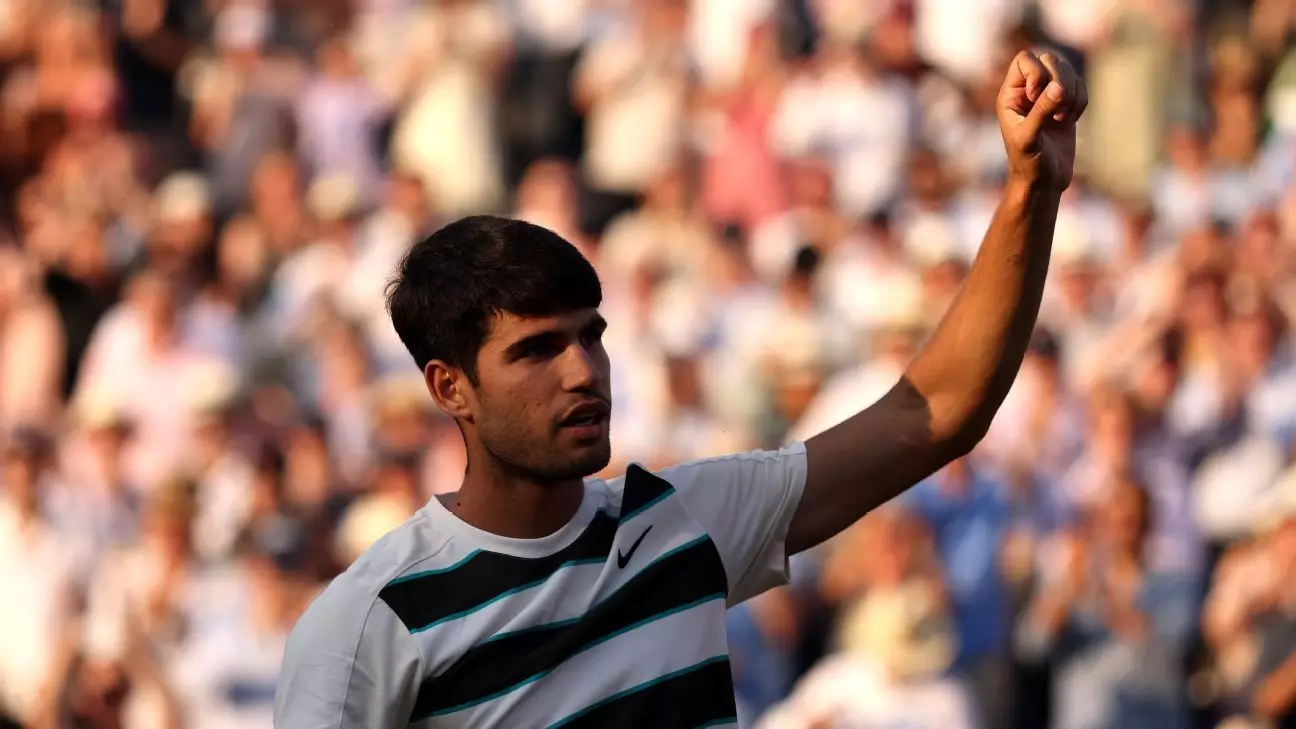In a riveting display of resilience and skill, top seed Carlos Alcaraz edged past compatriot Jaume Munar in a thrilling match at the Queen’s Club Championships. Their encounter was a testament to the dramatic nature of competitive tennis, unfolding in front of a captivated British crowd who witnessed a contest that stretched just over three hours. The match, which ended with a score of 6-4, 6-7(7), 7-5, was not just another routine victory for the young Spaniard; it was a showcase of his mental fortitude.
The world number two showcased incredible skill, but it was his ability to withstand pressure that truly stood out. As Alcaraz faced a crucial moment in the deciding set—down a break, one could sense the collective tension in the air. Yet, he rose to the occasion, demonstrating that the lessons learned from his epic French Open victory against Jannik Sinner were firmly entrenched in his psyche.
Lessons from Adversity
Alcaraz’s journey through this match was a masterclass in maintaining composure under duress. Despite dominating the first set and appearing in control, he faltered in the second. Munar, fighting valiantly, pushed him to a tiebreaker after having saved four set points earlier. It was a moment that could have easily deflated a less resilient player. However, Alcaraz’s grit shone through as he countered Munar’s competitive spirit, proving that mental resilience is just as crucial as physical prowess on the grass courts of London.
The tensions escalated in the final set, where both players exchanged breaks in a riveting dance of strategy and skill. Alcaraz’s resolve was commendable; facing the prospect of defeat, he dug deep and launched a comeback that showcased his talent and fighting spirit. Moments like these define a champion, and they will serve him well in his quest to secure a place in the annals of tennis history.
A Champion’s Narrative
Post-match, Alcaraz reflected on the arduous journey he had just navigated. He expressed pride in his level of play and acknowledged the mental and physical turmoil he endured throughout the match. This admission illustrates the dual battle athletes face—not only against their opponents but also against their internal struggles. Alcaraz’s journey through the match was a reminder that every point, every game, and every set is an opportunity to learn and grow as a player.
“I’m really happy I’ve given myself another chance in the quarter-finals,” he remarked, revealing an underlying commitment to continuous improvement. His upcoming match against French challenger Arthur Rinderknech will be another test of endurance and strategy, and one can only wonder if Alcaraz will secure his position at the top or if external pressures will weave a different narrative.
Emerging Talents at Queen’s Club
While Alcaraz’s match was a highlight, it was not the only significant moment at Queen’s Club. British number two Jacob Fearnley also made headlines by reaching his first ATP Tour quarterfinal. His victory against French qualifier Corentin Moutet embodies the excitement of emerging talents carving their path in the sport. Fearnley’s attitude of sticking to his game plan and aggression in key moments provided a fresh perspective, contrasting the high-stakes experience of veterans like Alcaraz.
His triumph is a reminder that young players bring a unique energy to the court, often challenging seasoned professionals and changing the narrative within tournaments. For Fearnley, the excitement of reaching the quarterfinals in front of a home crowd adds another layer of significance to what might be the beginning of an impressive career.
The Spectacle of Competitive Tennis
These matches at Queen’s Club are more than mere steps in a tournament; they are a spectacle, a combination of grit, resilience, and sporting drama. The players not only perform for the titles but also for their reputations, their legacies, and the stories that will be told long after they hang up their racquets. In the face of challenges, like the ones Alcaraz and Fearnley faced, budding narratives of perseverance and triumph are forged, making tennis not just a sport—but an arena of human spirit and competitive fire.
As the tournament progresses, one can look forward to more breathtaking encounters, and perhaps, a glimpse into the future of tennis.

